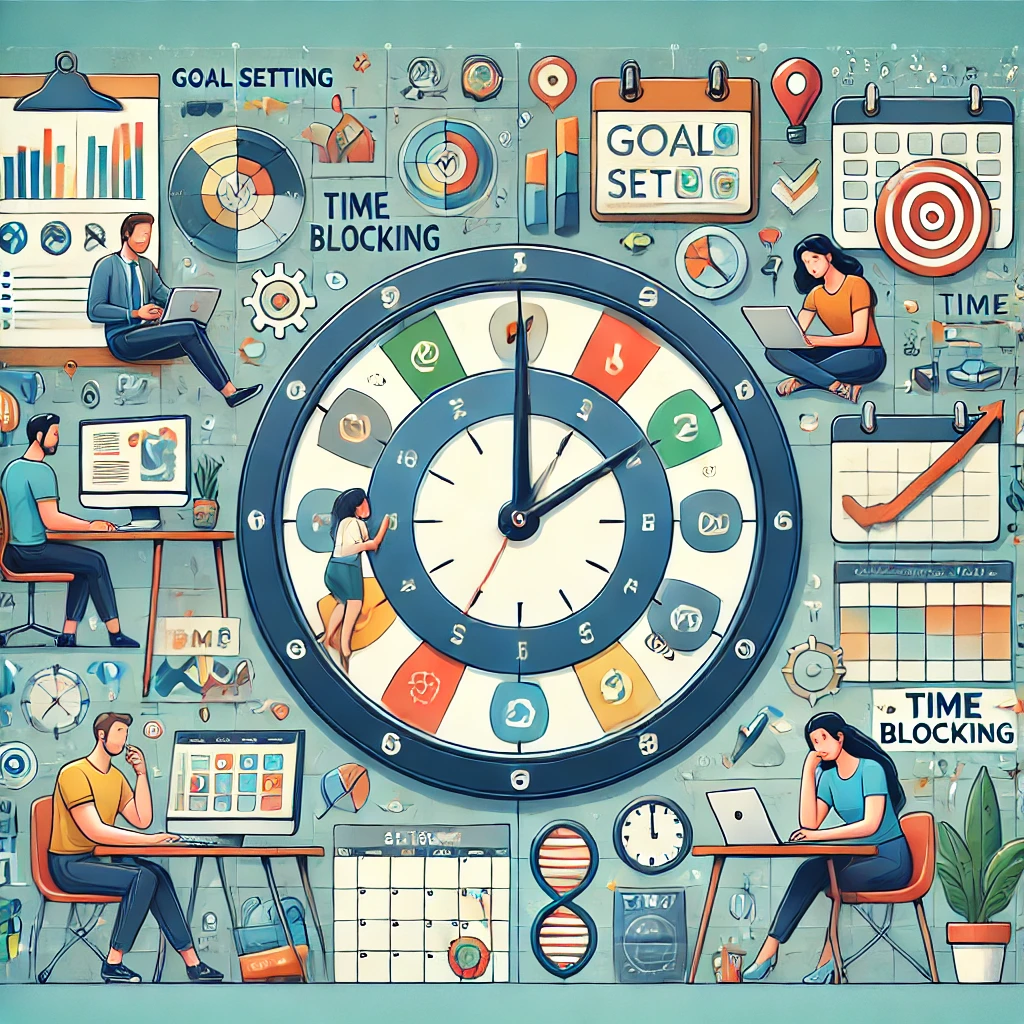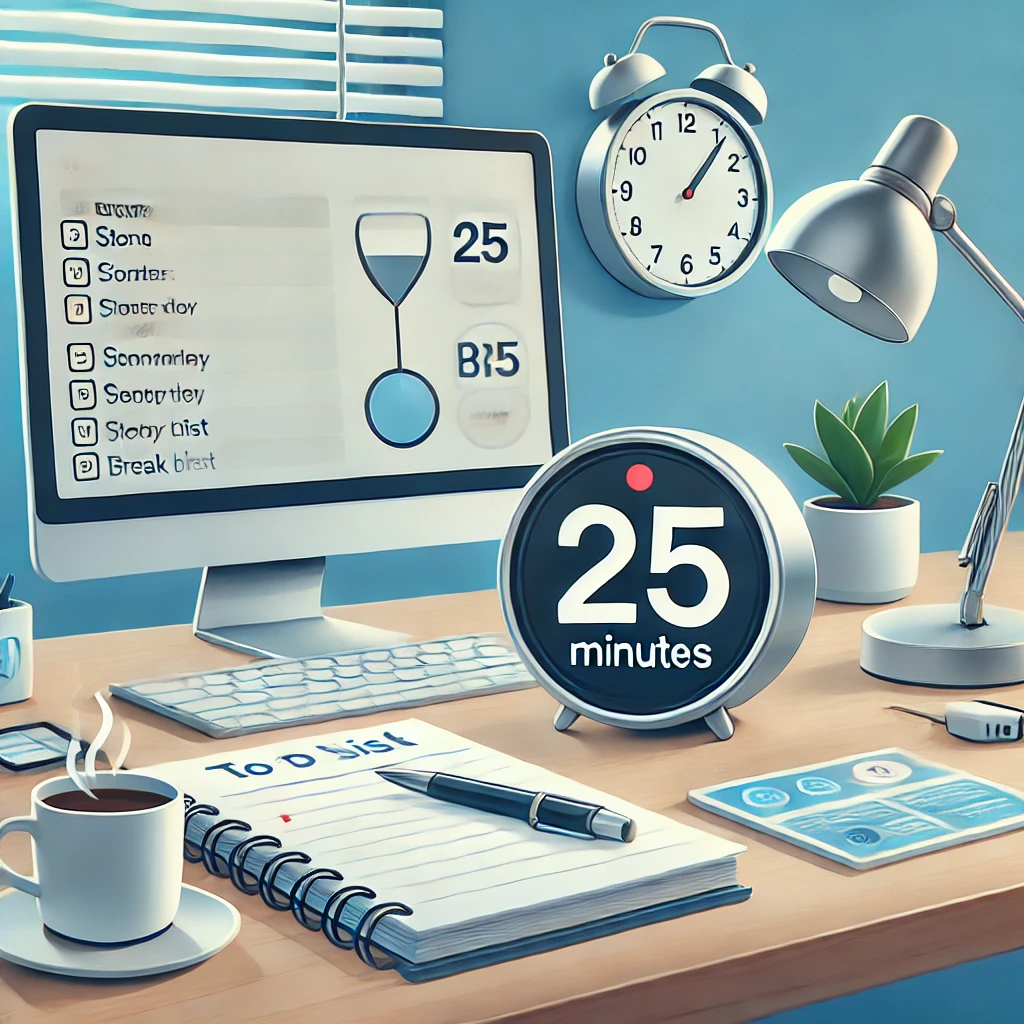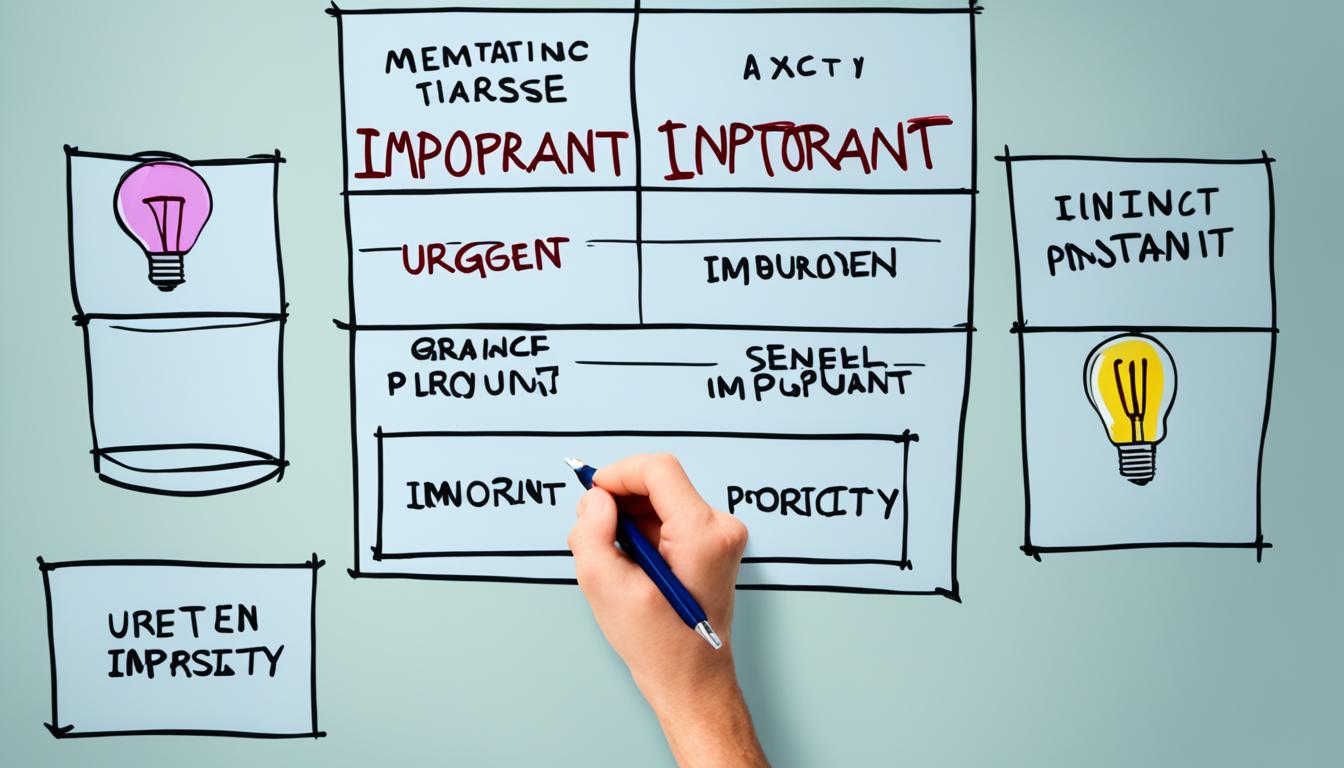Managing time is like mastering an art. It’s about using your time wisely to get big results. With 1,440 minutes each day, every moment counts towards your success.
To be organized helps you move smoothly between tasks. Emails can take over your day without a good system. Keeping your space tidy is important for your mood. Also, making a good schedule and knowing what to do first is key.

Setting goals can beat procrastination. Use Pareto’s Principle to focus on what matters most. Limit time on your phone to get more done.
Jason, a product marketer, found focusing hard because of web browsing. Learning about Parkinson’s Law helped him set better deadlines. Using the Pomodoro System led to better productivity for Jason.
Remember, time is limited. Use methods like “Eat the Frog” to tackle tough tasks first. This makes your work life better and more effective.
Understanding Time Management
Time management is about choosing how to spend our time. It involves dividing time between different activities. This helps in planning and allocating time better and becomes aware of self. It is important to know that time is limited. This way, we can avoid being overwhelmed and do tasks better and faster.
Setting and achieving goals is a key part of managing time well. Doing a time audit shows where our time goes. It helps us focus on work and less on things like social media. This can help in managing distractions and being more productive.
Creating good habits and routines is also important in managing time. For example, the time blocking method can be very helpful. It breaks the day into times for different tasks. This method makes sure we use every moment well. It can make us less stressed and healthier.
Good time management brings many benefits. It gives more time for fun things. It can also lead to better chances for success at work. Staying away from distractions and setting good schedules feels rewarding because we accomplish our goals.
Adults usually have about 8 hours each day for themselves. Good time management can greatly change how we use this time. By using methods like time blocking, we can manage our time better. This helps us focus on what we need to do and reach our goals more easily.
For more advice on managing time and reaching goals, check out resources on how to deal with distractions. They offer great ways to plan and use time effectively.
Being aware of how we use our time is also key to good time management. Paying attention to our daily habits helps us connect our actions to our goals. This makes sure even small tasks help us get closer to our long-term plans.

The Importance of Cognitive Bandwidth
Cognitive bandwidth is key in our daily tasks. It helps us make smart choices and stick to our plans. By using it well, we can resist temptations and avoid getting too tired. This leads us to do better and feel happier overall.
Definition of Cognitive Bandwidth
Cognitive bandwidth means the mental energy available for tasks each day. This is for things like making decisions, following plans, and saying no to temptations. The American Journal of Psychiatry says stress affects our thinking, both for normal thinkers and those who have a bit of trouble.
But we can boost this energy. Taking breaks and meditating can fill up our mental gas tank. This helps us make smarter choices and use our mental energy better.
Saving Cognitive Bandwidth
Good time management saves cognitive bandwidth. It cuts out distractions, letting our minds focus better on important tasks. A short, clear to-do list can make things easier, especially when we’re tired.
Harvard Health tells us that moving our bodies helps our brains work better. And drinking enough water, as the Mayo Clinic advises, keeps our mind sharp. This stops us from getting too tired.
Using helpful habits and notes can guide us toward good choices when our brain is tired. Writing stuff down and sharing our load with team mates are great ways to stay focused and productive at work.
Setting Realistic Goals
Setting realistic goals is key to better time management and success. Goals help us focus, commit, and get more done. If goals are not reachable, people often give up by February. So, setting goals we can actually meet keeps us going.
Value Put in Time
Valuing time lets us control our days. Those who are organized see time as helpful. They know how to set goals using the SMART criteria. This way, they can finish tasks on time and manage time wisely.

Identify Your Weak Areas
Finding our weak points in time management is crucial. It lets us tailor techniques that work for us. Self-improvement makes goal setting better. It leads to a more productive and stress-free life.
Utilizing Pareto’s Principle
The Pareto Principle is known as the 80/20 rule. It boosts productivity by focusing on essential tasks. Vilfredo Pareto found in 1897 that 80% of England’s land was owned by 20% of people. This idea suggests that 80% of success often comes from 20% of the work.
When managing your time, the 80/20 rule tells us something important. It says that a few tasks can make a big difference. By finding these tasks and focusing on them, you can boost what you achieve without working too hard.
Think about how it can make your work life simpler. For example, if a manager’s meetings are taking up 16 hours a week, reviewing them carefully can increase efficiency. Also, if a big chunk of the day goes to smaller tasks, focusing on what really matters can bring better outcomes.
You’re using the 80/20 rule well if you focus on tasks that help you reach your goals. It’s important that these tasks also make you happy. If you’re stuck in tasks that don’t fit your goals or skills, it’s time for a change.
Using this principle helps you use your time and energy better. It brings improvements in how productive you are every day and in the long run. By focusing on what’s truly important, you move closer to doing work that’s both meaningful and fulfilling.
Implementing Parkinson’s Law
Parkinson’s Law was born in 1955 by Cyril Northcote Parkinson. It’s a big idea for managing tasks. He said work grows to fill the time given. So, we often waste time by giving tasks more hours than needed.

Understanding Parkinson’s Law
Parkinson’s Law is about work expansion. It shows how we think about task time, not the actual time it takes. For instance, the Sydney Opera House was to be finished in four years. But, it took 14 years because of this thinking. So, it’s key to set the right amount of time for tasks.
Setting Realistic Deadlines
Deadline setting is key to stop work from growing too much. Deadlines that you set yourself can help. This makes us focus on how much time we really need for each thing. Techniques like timeboxing and the Pomodoro Method help a lot. They keep us sharp and focused. They also fight off laziness and help us do our best, as proven by the Yerkes-Dodson Law.
To beat Parkinson’s Law, use tools and ways to make time use better. Do this, and you’ll work smarter, not harder. It boosts how much you get done and makes you more efficient. Plus, it follows Parkinson’s Law advice.
Maximizing Productivity with the Pomodoro System
The Pomodoro Technique is great for managing time. It uses a clear plan for working and taking breaks. Francesco Cirillo created it in the 1980s. It divides work into 25-minute sections, called ‘pomodoros’, followed by a short break.

The technique is simple yet powerful. It helps in finishing big tasks by breaking them into small parts. This way, you can get more done and stay focused.
It also protects you from getting too tired. By taking short breaks often, your mind stays fresh. This keeps you sharp and avoids getting worn out.
Adding Pomodoro to your day helps a lot. It makes your time management better and your work habits strong. It fights off things that stop you from working, like being interrupted or putting things off.
With regular work times and breaks, you can do more. You work better but also take care of your mind.
Prioritizing Tasks with the Eisenhower Box
The Eisenhower Box, or matrix, is key to managing time well. It helps decide what jobs need to be done now or later. This way, you use your time better and get more done.
Categories of Tasks
This matrix sorts tasks into four groups. There’s Do for important and urgent tasks, like urgent projects. Then, there’s Schedule for tasks that are important but not right away.
Next, there’s Delegate for things that need to be done quickly but aren’t too important. Last, Delete is for tasks that just won’t help you, like wasting time in unnecessary meetings.
Using colors can also make it easier to see what to do first:
- Green for highest priority
- Yellow for second highest
- Blue for third highest
- Red for non-priority tasks
Eliminating and Delegating
The matrix also highlights the need to pass on or drop tasks. Jobs like answering every email right away may seem important but can be delegated. This gives you more time for things that really help your goals.
Getting rid of unimportant tasks makes choosing what to do easier. For example, avoid time wasters like long, dull meetings. This keeps your to-do list sharp and focused.

By following the Eisenhower Box, you’ll be better at picking what jobs matter most. It shows you the key difference between what’s urgent and what’s truly important. Try tracking your tasks and placing them in the right category for a week to see a change. This way, you’ll learn how to spend your time wisely and boost how much you get done.
Practicing Decision Making
Practicing decision making is key for managing time well. It helps us choose what’s most important and make better choices. This way, we use our time on things that help our personal or work goals the most.
It’s important to think about the tasks you need to do. By picking the ones that give the best results, you can be more productive. Research shows that even a tiny bit more time to decide can make us choose better.
Being organized and setting clear goals helps handle different work tasks. To stay focused, write your goals and put them where you often see them. Splitting big tasks into smaller ones also boosts how much work you get done. This makes it easier to see if you’re reaching your goals.
It’s vital to have set times for making choices, so you don’t put things off. Listening to your gut can help you decide faster and better. Methods like SWOT analysis and making pictures in your mind can also make choosing easier. They help you focus on what’s most important.
In the end, making better choices and decisions means you spend time on things that matter. It helps you use your time and skills well, for the best results.
Minimizing Distractions
To stay focused and achieve what we want daily, it’s key to reduce distractions. The first step is to find and get rid of things that pull us away. A clean and quiet space helps a lot. We should also build habits that keep distractions away, like turning off phone alerts during work times.
About 98% of workers face 3-4 distractions daily. These interruptions hurt the quality of our work. Also, people in the U.S. spend 2.5 hours daily on non-work content on their phones. It’s vital to handle digital distractions well. We can beat these with time management tricks and “Not-To-Do Lists.” This can make us really productive. Knowing our main goals helps us focus on what’s truly important.
Setting up good habits over 18 days is a powerful way to stop distractions. Lots of small daily choices can make us tired and slow us down. But, we can avoid this by organizing our days better. This means simplifying our tasks and also our workspaces. Journaling and meditation can clear our thoughts, helping us work more effectively.
The Role of Delegation
Delegation is key in managing time well. It helps spread tasks effectively. This way, people focus on what they do best.
Empowering Others
Through delegation, people feel more responsible and motivated. They also get better at their jobs. By explaining tasks clearly, leaders ensure that skills grow and time is well spent. This makes the team better and more confident.
Focus on Core Functions
Delegating lets leaders concentrate on important tasks. These tasks match their skills. By giving the right tasks to the right people and supporting them, time is managed well. This leads to better leadership and team work.
Time Management Mindset
Having a time management mindset is key for a balanced life. It helps in both your personal and work life. By building good habits, you can boost how much you get done each day. This change boosts daily work and bigger goals.
Managing time right is vital. Richard Carlson talked about picking quality work over many tasks. It’s smart to look at your work often. This way, you can stop doing things that waste time. Doing this can keep your life in balance. It looks at your mind, body, soul, and feelings. Keeping a journal of how you spend your time for a week can show where to do better.
Getting better at time means always learning. Setting goals and learning new things are key. Choose to do things that bring real value. This might free up 3–10 more hours a week. Working with a growth mindset teaches you to know what really matters. This way, you can feel happy and successful.
To keep doing well over time means taking care breaks. This includes time off for family, health, or sad times. Making room for these breaks helps keep your mind and health strong. Then, you can keep going strong for the long run. It makes life more satisfying and full.
Conclusion
Learning to manage your time well is powerful and makes your days better. You can do different things to get organized, like using the Eisenhower Matrix and setting SMART goals. It’s also good to learn why we might delay doing things.
By starting your day with a routine and doing things like meditating, you can stay focused. This helps you handle any problems that come up easily.
Making good use of your time can make you 30% more productive. It also lowers stress at work by 25%. People who are good at managing their time achieve their goals more often. Time management classes have become more popular lately.
Being patient and sticking with your plan is really important when managing your time. Start by making small changes. By setting goals, organizing your days, and getting rid of things that waste your time, you can find a good balance. This balance helps in both your work and personal life. With effort, everyone can reach their goals and live a happy, balanced life.
FAQ
What are effective time management techniques to improve productivity?
Good time management means setting clear goals and deciding which tasks are most important. It’s also about creating a schedule. Avoiding things that distract you is key to using time well. You can boost productivity with methods like the Pomodoro System, the Eisenhower Box, and Pareto’s Principle.
How do planning and allocating time help in time management?
Planning your day helps put things in order and makes sure you deal with important jobs first. This planning can stop you from feeling like you always have to hurry. It helps you work better and know what’s really important.
What is cognitive bandwidth and how does it affect time management?
Cognitive bandwidth is the thinking power we have each day. It’s used for making choices, sticking to plans, and saying no to things we might want to do. Good time management keeps us from wasting this mental energy on things that don’t matter.
Why is setting realistic goals important in time management?
Realistic goals ensure you can finish tasks on time without getting too stressed. They help you see the value of your time. Setting smart goals also keeps you focused on what really matters for getting things done.
How can Pareto’s Principle be utilized in time management?
With Pareto’s Principle, focus on the few tasks that really make a big difference. By doing this, you use your time for the most important work. This approach is a great way to increase your productivity.
What does Parkinson’s Law imply for setting deadlines?
Parkinson’s Law means tasks can stretch to fill the time you give them. Setting tight but realistic deadlines makes you work harder. This helps you get more done and keeps you on track.
How does the Pomodoro System maximize productivity?
The Pomodoro System divides your work into short, focused periods with breaks in between. This approach fights fatigue and keeps your mind sharp. You end up working more steadily and efficiently.
What is the Eisenhower Box and how does it help prioritize tasks?
The Eisenhower Box sorts your tasks by importance and urgency. It helps you see what to do right away from what can wait. This method cuts out tasks that aren’t really necessary, giving you time for what matters most.
Why is practicing decision-making vital in time management?
Making good decisions helps you focus on the most important tasks. It gets you thinking about what really brings value. This way, you spend your time on activities that push you toward your goals.
How can one minimize distractions to maintain focus?
To stay focused, pinpoint and remove anything that could distract you. Set up a workspace that’s good for concentrating. Develop habits that keep interruptions at bay. All this helps you work through your goals without unnecessary stops.
How does delegation play a role in effective time management?
Delegating tasks lets you concentrate on what you do best. It also helps others grow their skills. By sharing the work, everyone can achieve more. It builds a stronger team spirit too.
What constitutes a time management mindset?
Having a time management mindset is about being careful with how you use your time. It’s putting your main goals first and making sure everything you do supports them. This way of thinking helps you lead a balanced life with room for what’s important.

More Posts
Mastering Time Management in HR- Effective Techniques for Success
Time management in HR is crucial because Human Resources (HR) professionals do many tasks. These include hiring, training, and dealing with employees. LaShawn Davis from The HR Plug says they may take on...
How Staying on Track Helps Overcome Procrastination
Staying on track is key to beating procrastination. This issue affects how well we work and reach our goals. It's not just about being lazy. Most people who put things off work hard...
10 Work from Home Tips that Work Like a Charm for Newbies
The growing popularity of working from home is changing the corporate landscape. Working remotely from home is changing the traditional ways global workspaces used to operate as the world is transitioning into new...
Man's Search for Meaning: Lessons to Beat Procrastination
Many people get stuck in the cycle of putting things off. This is often because of worries and feeling bad about themselves. Viktor Frankl's ideas in "Man's Search for Meaning" can help us beat procrastination...